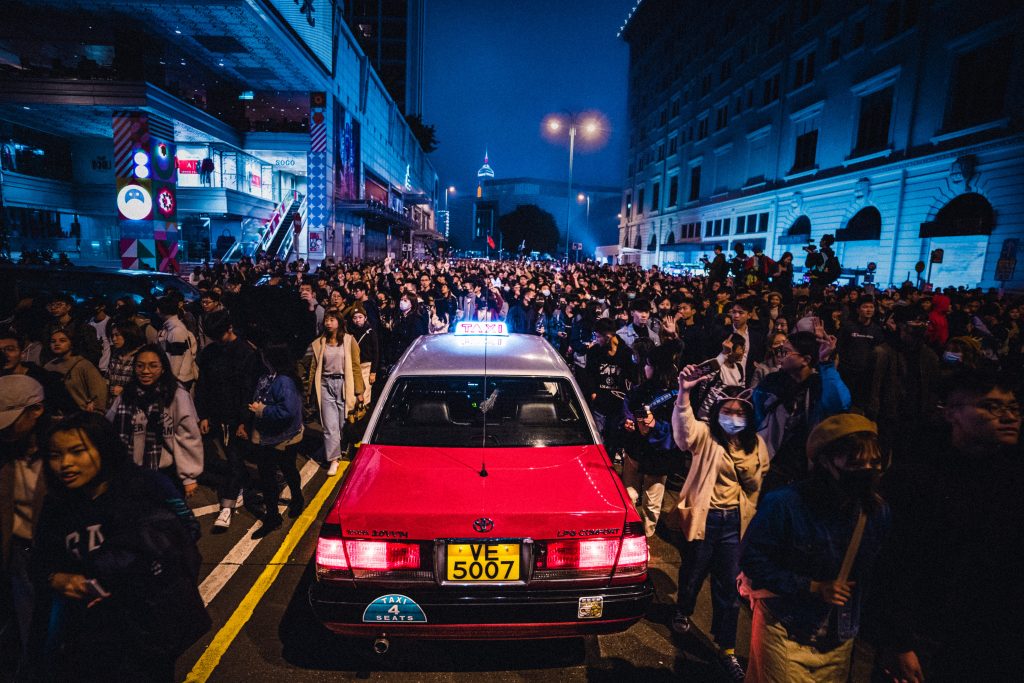Interviewer and Editor: Sarah Khan, Social Development and Policy 2021
Habib University, Karachi
Date (December, 30th 2020)
Note:
This interview is on the democracy movement currently ongoing in Hong Kong. For this interview, we spoke to a university professor from a higher education institute in Hong Kong. They have chosen to remain anonymous due to China’s repressive laws in dealing with political dissent. For the purposes of this interview, we will use their pseudonym Xiao Hu.
The interview has been published with no changes to the interviewee’s answers to the questions posed except where words or phrases have been added in square brackets, or information provided in endnotes to explain the terms and bridge gaps in the interview. This has been done to make the interview more legible to an audience unfamiliar with the circumstances of the Hong Kong democracy protests. The interview does not provide a complete account comprising all facets of the protests. It offers only a concise overview of the present situation in Hong Kong from the perspective of the interviewee. The opinions shared in the interview do not necessarily reflect those of the Tezhib Journal or those of Habib University.
Background
As a British colony, Hong Kong followed a different historical trajectory than China. When China became a Communist State in 1949, many Chinese fled to Hong Kong to seek refuge from persecution. Following the formal handover of Hong Kong by the British to the Chinese government in 1997, Hong Kong became a Special Administrative Region (SAR) for China. It was granted its own mini-constitution known as the Basic Law that came into effect in 1997. This also granted the people of Hong Kong basic democratic rights including free speech and freedom of assembly. By the “One Country, Two Systems” arrangement, Hong Kong was to gradually be granted complete political autonomy from China, and by 2047 become independent. However, the Chinese central government has been involved in the curtailment of the political freedoms of the people of Hong Kong. This has sparked widespread protests in Hong Kong.
Interview
Khan: What are the Hong Kong democracy protests about? Could you give us a bit of background about the Hong Kong and China political crisis?
Xiao Hu: According to the Basic Law [that was] stipulated before 1997, agreed [upon] by the Chinese and British governments, [and] consented [to] by the majority of Hong Kong locals, Hong Kong [would] gradually have direct election of its Legislature and the Chief Executive. But after 1997, the people of Hong Kong did not see much progress in terms of related discussion and legislation [towards gradually granting Hong Kong political autonomy from mainland China]. That is why a group of educators and lawyers initiated the Occupy Central Movement in 2013 in order to peacefully persuade the governments (of both Hong Kong and China) to start consultation and legislation of universal suffrage[i] in Hong Kong. In 2014, because the government wanted to impose a ‘national’ education curriculum into the high school syllabus [in Hong Kong], young students began protesting. They gathered in the Civic Plaza outside the government headquarters. This later kick-started the Occupy Central Movement, in which major roads of Central, Admiralty, and Mong Kok became blocked by thousands of protestors for 78 days. The government did not react to the movement at all and [instead] let it die out. On August 31 2014, the Beijing government made the decision that even though Hong Kong people could have election rights, the candidates must be vetted by the Central Government [in China] beforehand. [As a result,] HK people become very disillusioned and disappointed. Meanwhile, more mainland Chinese tourists made the city even more unaffordable. [Owing to this,] some youngsters became more radical and they started another protest in 2016 called the FishBall Revolution. Most of these youngsters were arrested and given severe sentences. Some started to go in[to] exile [to escape penalties]. The 2019 Anti-Extradition Bill Movement[ii] is a continuation of this bigger movement to fight for universal suffrage.
Khan: What is happening in Hong Kong right now and is it linked to the Extradition Bill?
Xiao Hu: The turning point was June 12, 2019 when Carrie Lam said she would continue to push for the legislation of the Extradition Bill after 2 million people came out [to protest] on the streets [demanding the Bill’s complete withdrawal]. On July 1, some young protestors got so angry and disappointed that they broke into the Legislature Building and graffitti[ed] the meeting rooms. No one was hurt. The police became very violent and many protestors were arrested. [As a result of these arrests,] people became even more agitated.
Khan: What is the age demographic participating in the protests? Universities became a center of political dissent… are a majority of the protestors young?
Xiao Hu: Yes, people of all ages. I know of many above 65 who participated [in the protests]. Since the police have arrested more than 10,000 people, it has intimidated [the protestors’] families and friends. More people are not happy with the government.
Khan: How have the authorities in Hong Kong and China reacted to the protests? Specifically, how has the Chinese central authority reacted to the protests? Have they become more fearful of a loss of authority? How is the National Security Law[iii] related to all of this?
Xiao Hu: The people of Hong Kong were hoping that the central government [in China] would understand the corruption (for instance, all these land developers have reaped so much profit with more mainland visitors) in Hong Kong, but in vain.
The Hong Kong government instead accused protestors of “wanting HK independence” instead of reflecting our hope for democracy, and [bringing] more social reforms in HK. Perhaps the central government did not want things to go down this way. But after seeing how Carrie Lam failed to manage things, it entirely took over control and stopped all autonomy promised before.
In Hong Kong, on July 1, 2020, which was the 23 anniversary of the handover [of Hong Kong by the British to the Chinese,] about 200,000 people came out on the streets to protest. The National Security Law was passed on the same day, and the police began to arrest 300 people on a daily basis. By now, no one dares to protest anymore.
Khan: Protests began in a pre-Covid, normal world, now after almost a year, how has the pandemic affected the protests?
Xiao Hu: No public gathering is allowed ever since the outbreak of the pandemic. The government uses the pandemic as an excuse to take away all our rights of assembly and expression. The bans have dealt a blow to the Movement. The government wants to use an app to check our whereabouts in the name of pandemic control but almost no citizens use that app. Now, we fear that the government would make the app compulsory when we enter public service buildings such as universities, libraries, or hospitals.
Khan: The movement is a leaderless one – what are the possible consequences of that?
Xiao Hu: It could die out as people are massively leaving the territory, but people do know what is going on.
Khan: Is there any agreement or consensus on ‘what next’?
Xiao Hu: No…
Khan: So it is not a united movement… there are disagreements within?
Xiao Hu: Yes, [there is] always a lot of disagreement. But now even peaceful pro-democracy legislators who have condemned the violent approach had been arrested, the divide is less important. In other words, both the radical protestors and the peaceful legislators are going to jail. That is Beijing’s shock and awe approach. It also does not care too much about the reputation damage of Hong Kong as an international financial city.
Khan: How big of a concern to Beijing is the American threat of retaliation?
Xiao Hu: Very little concern, as far as I think, as the American is now in crisis. The retaliation is targeting individual officials anyway.
Khan: And what about the souring of China’s relations with Britain?
Xiao Hu: Very little concern as well as Britain needs China ever more in the post-Brexit and post-pandemic national crisis.
Khan: So US and British condemnations do not act as a deterrent for the clampdown by the Chinese central government?
Xiao Hu: Not that I can see.
Khan: And finally, where do you see these protests going in the future?
Xiao Hu: We are trying to survive first. Hong Kong people have never been through violent rule before, and now we are looking at many other lessons in other countries and in recent histories for reference.
[i] Universal suffrage refers to the right of the people of Hong Kong to elect their government officials through election without the meddling of Chinese central government.
[ii] The Extradition Bill proposed in 2019 would allow Hong Kong to be tried in mainland China and Taiwan. Notably, China did not have any extradition agreements with either Taiwan or China. Carrie Lam, the Hong Kong Chief Executive, maintained that the bill was necessary to prosecute a man guilty of murdering his girlfriend in Taiwan in 2018. He could not be prosecuted for murder in Hong Kong as the act had been committed in Taiwan. Taiwanese officials said they did not have the authority to prosecute the man either due to the absence of any extradition agreement between the two territories. However, critics pointed out that the Extradition Bill would allow for an increase in influence of mainland China over Hong Kong. The bill was criticized as a pro-Beijing policy that would compromise the autonomy of Hong Kong.
[iii] Under Article 23 of the Basic Law, the local government in Hong Kong was to put into place laws against acts including sedition and subversion of Chinese central authority. However, attempts in the past by the Hong Kong government to enact these laws were met with protests and were unsuccessful.

